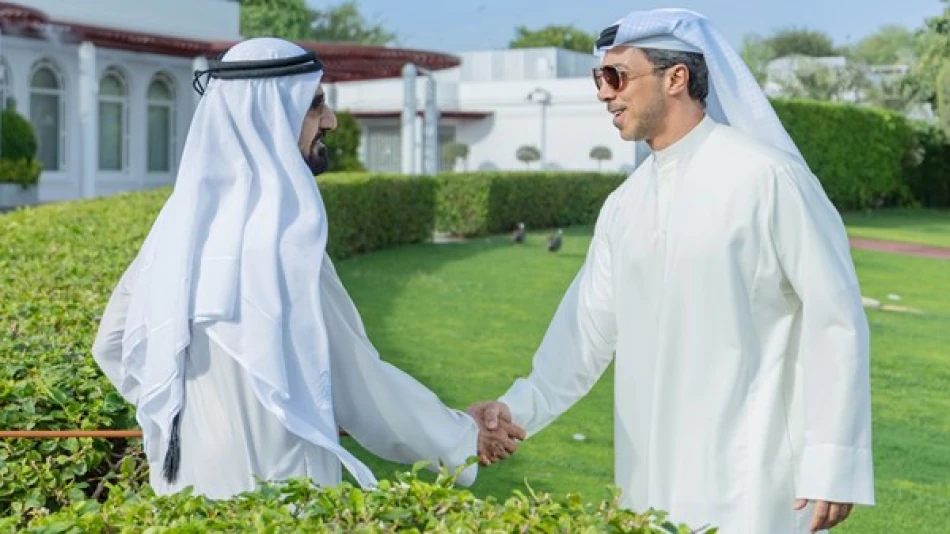
UAE Leaders Discuss Boosting Comprehensive Development
UAE Leadership Doubles Down on Economic Diversification as Regional Competition Intensifies
Senior UAE officials held strategic discussions this week focusing on accelerating national development targets and strengthening the country's position as the region's leading economic model. The high-level meeting between Dubai's ruler Sheikh Mohammed bin Rashid Al Maktoum and Deputy President Sheikh Mansour bin Zayed Al Nahyan signals continued coordination at the top levels of government as the Emirates faces growing regional competition and global economic headwinds.
Strategic Alignment at Critical Juncture
The meeting, held at Sheikh Mohammed's retreat in Dubai's Al Marmoom area, brought together key figures in the UAE's leadership structure, including Foreign Minister Sheikh Abdullah bin Zayed Al Nahyan. The gathering focused on national development acceleration and enhancing citizen welfare—priorities that have become increasingly urgent as neighboring countries ramp up their own economic transformation efforts.
Sheikh Mohammed emphasized the shared responsibility of leadership in building "a more prosperous future for coming generations" and cementing the UAE's status as the region's most successful developmental model. This messaging comes as Saudi Arabia's Vision 2030 and Qatar's National Vision 2030 create new competitive pressures across the Gulf.
Economic Implications and Market Positioning
Regional Competition Drives Innovation
The UAE's renewed focus on development acceleration reflects the reality of intensified regional competition. Saudi Arabia's NEOM project and massive infrastructure spending, combined with Qatar's post-World Cup economic diversification push, has created a dynamic where Gulf states must continuously innovate to maintain their competitive edge.
For investors, this coordination signals continued policy stability and commitment to business-friendly reforms. The UAE's track record of rapid policy implementation—from the Abraham Accords to cryptocurrency regulation—suggests that initiatives discussed in such high-level meetings often translate into concrete market opportunities within months.
Government Services and Digital Transformation
The meeting's emphasis on improving government services and supporting various sectors of Emirati society points toward continued investment in digital infrastructure and public service modernization. This aligns with global trends where countries like Estonia, Singapore, and South Korea have gained competitive advantages through comprehensive digital government initiatives.
The UAE's approach differs from purely technology-focused strategies by maintaining emphasis on comprehensive development—balancing economic growth with social welfare and citizen satisfaction. This holistic model has proven particularly effective in attracting international talent and investment.
Strategic Outlook and Implementation
The coordination between Dubai and Abu Dhabi leadership structures demonstrates the federal system's ability to align on major strategic priorities despite each emirate's distinct economic focus. This unity becomes crucial as the UAE navigates global economic uncertainty, regional geopolitical shifts, and the transition toward post-oil economic models.
The meeting's focus on doubling efforts and integrating capabilities suggests upcoming policy announcements or initiative launches. Given the UAE's pattern of rapid implementation, markets and businesses should expect concrete developments in government services, economic incentives, or regulatory frameworks within the coming quarters.
As regional competition intensifies and global economic conditions remain volatile, the UAE's emphasis on coordinated, accelerated development positions it to maintain its advantage as the Middle East's primary business and innovation hub.
Most Viewed News

 Layla Al Mansoori
Layla Al Mansoori






